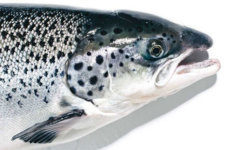Hometown Food Company announced a voluntary recall on two lots (12,185 cases) of Pillsbury Unbleached All-Purpose Flour because it may be contaminated with Salmonella. The recall was initiated after the company found Salmonella in a sample. The products were distributed through a limited number of retailers and distributors nationwide. The company had not received any direct consumer reports of confirmed illnesses associated with the recalled flour. @ https://www.foodpoisonjournal.com/food-recall/salmonella-recall-pillsbury-unbleached-all-purpose-flour/
ruth
Hometown Food Company announced a voluntary recall on two specific lot codes of Pillsbury Unbleached All Purpose Flour because it may be contaminated with
ruth
Public Health Agency of Canada and The Canadian Food Inspection Agency and Health Canada announced that the Salmonella outbreak in Canada that is linked to frozen breaded raw chicken and other raw chicken products has now grown to include 555 sick as of March 1, 2019. So far, twelve products have been recalled in association with this outbreak. The provinces affected are: British Columbia (42), Alberta (84), Saskatchewan (18), Manitoba (27), Ontario (201), Quebec (115), New Brunswick (28), Nova Scotia (18), Prince Edward Island (6), Newfoundland and Labrador (12), Northwest Territories (1), Yukon (1), and Nunavut (2). Ninety-two people have been hospitalized because they are so ill. No Name Chicken Nuggets, Uncooked, Club Pack (2 kg)is responsible for one outbreak involving 19 people sick in 6 provinces; they got sick between December 2018 and February 2019. A second outbreak resulted in 61 people sick in 10 provinces; they got sick between June 2018 and February 2019. The products associated with the outbreak include Crisp & Delicious Chicken Breast Nuggets. @ https://foodpoisoningbulletin.com/2019/salmonella-outbreak-frozen-chicken-canada/
The Salmonella outbreak that is linked to frozen raw breaded chicken and other chicken products in Canada has grown to 555 sick.
ruth
The FDA announced that it is committed to helping food developers bring biotechnology innovations to market while at the same time providing consumers with high safety standards. In 2015 FDA approved an AquAdvantage Salmon, a Genetically Engineered (GE) Atlantic salmon that contains the first approved intentional genomic alterations (IGAs) in an animal intended for food use. Today, the FDA is deactivating a 2016 import alert that prevented GE salmon from entering the U.S. However, product alerts were required by Congress. The FDA’s approval of the application related to AquAdvantage Salmon followed a comprehensive analysis of the scientific evidence, which determined that the GE Atlantic salmon met the statutory requirements for safety and effectiveness under the Federal Food, Drug, and Cosmetic Act. The FDA no longer has the authority to issue labeling guidance on this topic; however, the FDA believes this Congressional mandate has been satisfied by the USDA’s issuance of final regulations implementing that law in late 2018 because the law contains labeling indicating that it is bioengineered. @ https://www.fda.gov/NewsEvents/Newsroom/PressAnnouncements/ucm632952.htm?utm_campaign=3-8-2019-GESalmon&utm_medium=email&utm_source=Eloqua
Statement from FDA Commissioner Scott Gottlieb, M.D., on continued efforts to advance safe biotechnology innovations, and the deactivation of an import alert on genetically engineered salmon
ruth
United States Department of Agriculture- Food Safety and Inspection Service (USDA-FSIS) and Food and Drug Administration (FDA), published an outline of their agreement on how to regulate the budding cell-based meat industry in the US. This agreement gives the FDA oversight of cell collection, cell banks, and cell growth and differentiation. FSI will take over during the cell harvest stage, overseeing production and labeling of human food products derived from the cells of livestock and poultry. According to MeatingPlace, most industry representatives breathed a collective sigh of relief that the agreement finally had been reached. Some in the industry are concerned that cell-based meat will be labeled as beef, while others are concerned that the US will be left behind Israel, China, Japan, the Netherlands, Singapore and other countries that are moving quickly to ensure a clear path to market for this method of meat production. For example “..our position that the term ‘meat,’ and more specifically ‘beef,’ refers to products derived exclusively from the flesh of a bovine animal harvested in the traditional manner,” USCA’s Graner said. “Under the formal agreement, it appears that USDA FSIS will issue the USDA meat inspection stamp to be used on [cell-based] products. Good Food Institute Director of Policy Jessica Almy said the agreement “is a significant step forward in providing a transparent and predictable regulatory path to market for cell-based meat, which will help to ensure that the U.S. does not fall behind. @ https://www.meatingplace.com/Industry/News/Details/84412
Meatingplace.com is the online community for North American beef, pork and poultry processors.




